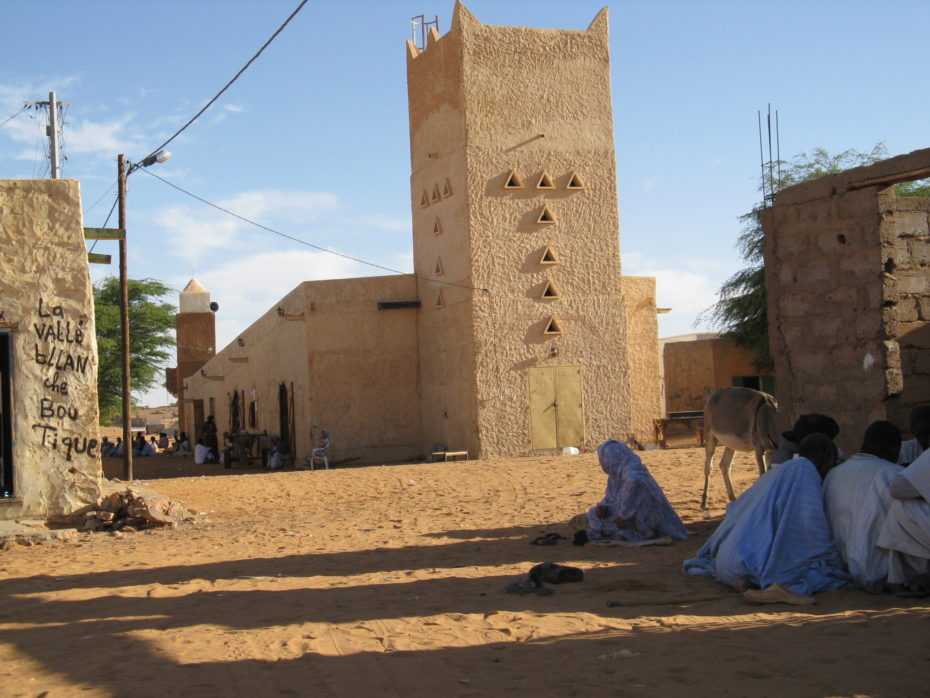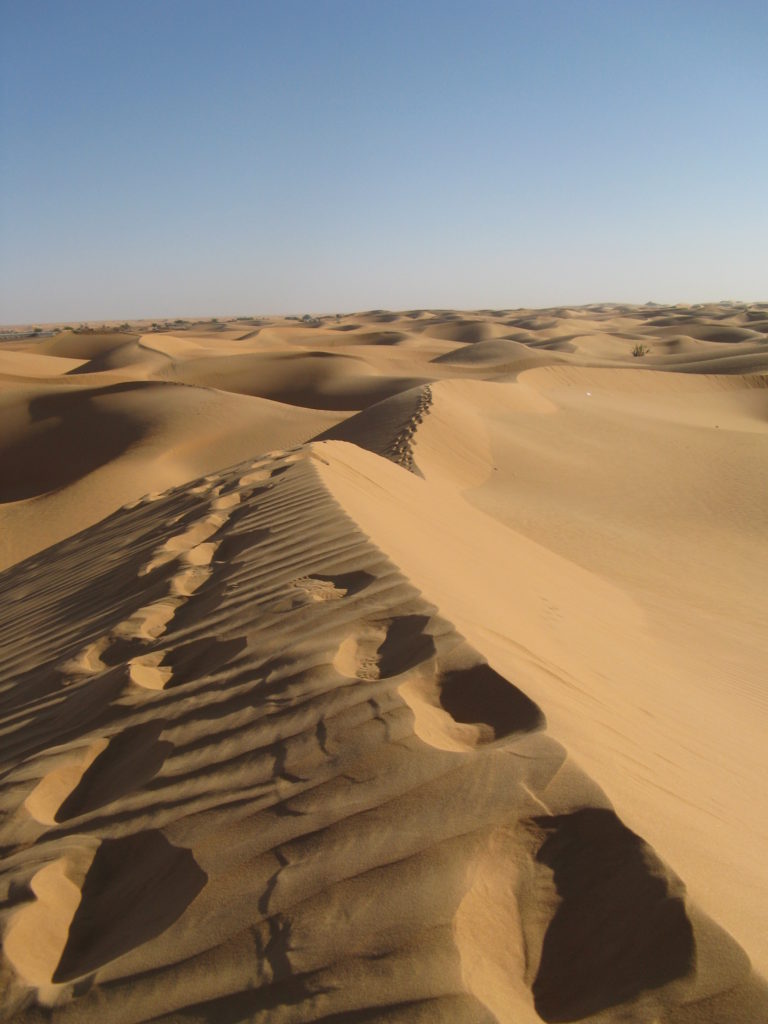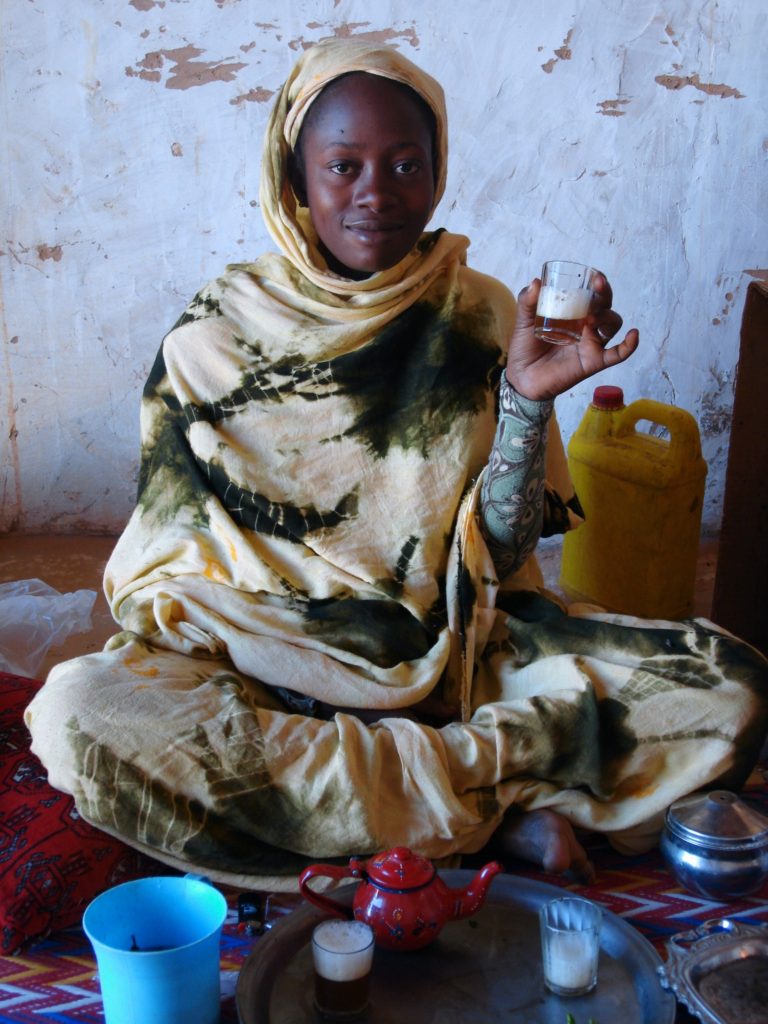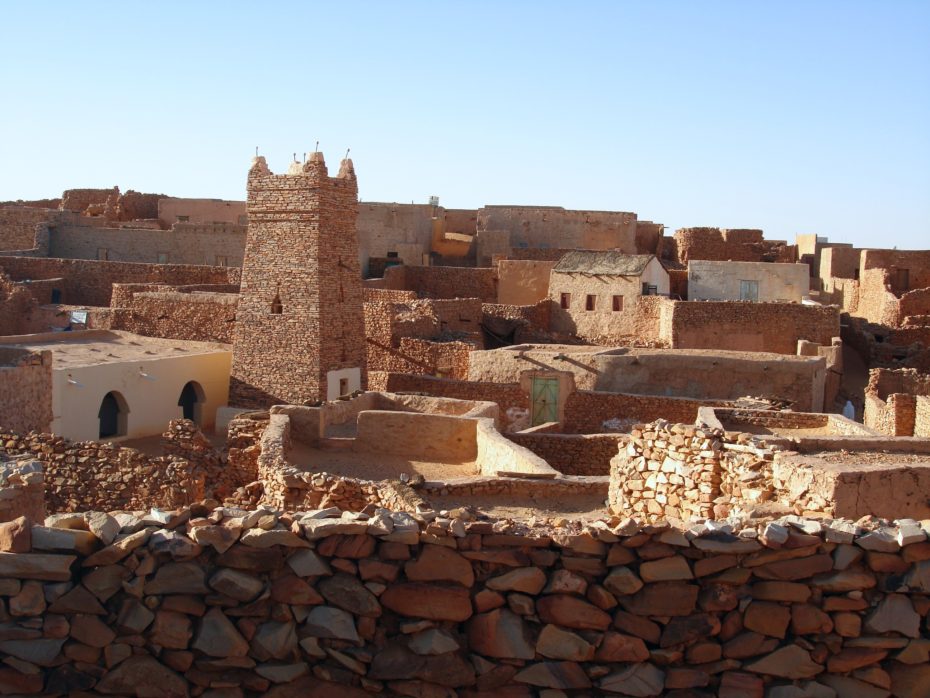The desert town of Chinguetti was once a must see for the predominantly French tourists in Mauritania but the decimation wrought by EU government travel warnings meant that Steve and I accounted for at least 25% of the visitors on any day of our 4 days there. Whilst this may well add to the level of “authenticity” of the travel experience for those of us who have bothered, it is difficult to overstate the desperate plight of the inhabitants of a town abundant in only one thing: sand.
The victims of terrorism and The War On Terror TM are not only those of bombs, guns and torture chambers and are easily forgotten in such times. I would have been quite prepared to forgive far more aggressive sales tactics in such a situation but Mauritanian character made this quite unnecessary.
For the academically minded of us Chinguetti offers the chance to peruse ancient manuscripts in a number of its stone libraries dating back to the 12th century. The town was once a great centre of Islamic scholarship as well as a rallying point for pilgrimages to Mecca, from where thousands of heavily laden camels would depart. Needless to say it is looking somewhat shoddier these days but it could never detract from the surrounding Sahara Desert. The view from the highest dune as the setting sun illuminated a rippling expanse of orange and bronze sands was probably one of the most awesome I will ever see. Like a vast tableau of chaos art, the infinity of dunes was recreated in miniature at our feet and yet again on an even smaller scale within this pattern, all determined by the same natural order of the winds.
Thankfully the visit wasn’t all tending towards such metaphysical musings as is proved by an encounter on our first night. Led by the sound of percussion we were invited by a group of women into a large stone room where we joined in dancing to their drumming, singing and an hour of hilarious entertainment. If your perception of head shrouded Islamic women is one of meek submission, think again. We were treated to a dance and other acts of such lewdness they would have been perfectly at home amongst booze addled British girls on a hen night, although knickers did remain firmly on. I’ll spare those of you of a sensitive disposition the details but I think we can safely say that it wasn’t a traditional Berber dance handed down from their great grandmothers. Steve’s lack of grasp of the French language was saved by the foresight of responding to any question with an uncomprehending “umm” and laughing which rescued him from inadvertently accepting a marriage proposal. It is probably worth remembering that this is a society where girls can be married as young as 9, although they generally would not move out of their parents home til about 14, where child bearing age tends to start. Given this and the hoards of excitable kids running about most of these young women would be married with families.
On a level rather more in keeping with traditional celebrations within Islam we were made to feel most welcome at a meidah ceremony. This could probably be described as the equivalent in the good old days of getting round the family piano to sing favourite tunes, except that the accompaniment was provided by banging an upturned metal bowl and a jerry can. To this backing young men and women chanted, in call and response fashion, praises to Mohammed and Allah whilst clapping in a rhythm we never quite succeeded in mastering. Occasional inputs were provided by women’s ululations and euro pop hits from mobile ring tones. Either mobile phone manufacturers are oblivious to indigenous musical heritages or euro pop has a global street cred we in Britain have somehow failed to recognise.
The homes of these formerly, generally nomadic people still retain the sparseness of a culture where if an object had no practical value there was no justification for carting it about. Hence spaces which would happily seat 30 people have, aside from mats and a few small cushions, literally only one object in them such as a tv or a clock. And designer minimalists think they are being modern!
In a country mostly composed of sand it’s no wonder that even the streets of the capital Nouakchott are awash with it. It gets everywhere, including cameras as I unfortunately discover. The city may not win any prizes for beauty but it is welcoming enough and fairly hassle free. However, its traders seem afflicted by the unusual inverse value attentiveness disorder, whereby vendors of goods and services you have absolutely no interest in purchasing (eg: commercial fabrics and plastics) do more to get your attention than those whose services you do. “Sorry to interrupt your vital job of aimlessly shuffling empty cartons but we’d like to buy a cd of traditional Mauritanian music”. “Uh”. “Traditional music?” Silently handed box of pop hits. “No old, traditional music”. Eventually another box of pop hits is located. Exit shop. On a couple of occasions I was almost tempted to say “for gods sake we are wealthy foreigners who will probably spend more money than you would usually take in a whole day and you can even overcharge us, if only you expended a modicum of effort”.
Islamic republics are not noted for their wild nightlife but unlike Iran nightclubs do exist and our visit luckily coincided with a hip hop festival. Ayatollah Khomeini would be turning in his grave if he knew Islamic Republics had descended into such debauchery . I’d guess it’s not a major stretch of the imagination to suggest that you, dear readers were largely unaware that a Mauritanian hip hop scene even existed but I can assure you it is alive and well. Although very much influenced by its US counterpart and using the hand gestures and expressions (“everybody say Woah-oh”) beloved of rappers worldwide, it remains very much an Islamic scene: no drink; no drugs; a break for evening prayers and the prospect of an MC thanking the police for their hard work would be laughable outside of anything but a Christian rap scene – there must be one somewhere. Some of the biggest responses from the crowd were for calls such as, “Nouakchott, make some noise if you love the words of the prophet Mohammed”. I don’t mind saying if Steve and I were the only white faces at a hip hop gig in the UK or US I might feel slightly apprehensive, but we were made to feel completely at ease at both nights of the festival.
World music in the UK is very much coloured by a white, middle class, middle aged viewpoint of traditional music which would tend to be quite dismissive of what was on offer. To me it offered a view of what world music should be in some respects. Perhaps even more than jazz, hip hop has taken the creation of urban descendents of African slaves in America to every continent with a message that resonates across cultures, religions and languages. How many of our great wordsmiths could construct a coherent sentence from four diverse tongues, such as English, French, Arabic and Wolof in the way that Africans can, to crowds that comprehend. Love it or hate it as a musical form it can represent a constructive and inclusive view of cultural globalisation that multinational corporations never will. The drugs, guns and bitches mentality that has blighted the genre in the West often makes little headway in the rest of the world. Certainly from the French rapping used by some of the acts that I could follow, the messages were positive ones.









Thanks for your support and thoughts. You may well be right about spicing up the visuals but whilst backpacking around some of the poorest countries in Africa relying on shoddy internet cafes its difficult to do much more than the basics. When I am back in the UK for a brief stop I need to do what I can to push the blog more, I know I am probably a bit old school in concentrating on the writing and with my limited technical skills I need to blag help to do what most kids do with their eyes closed. Thanks again for the advice.